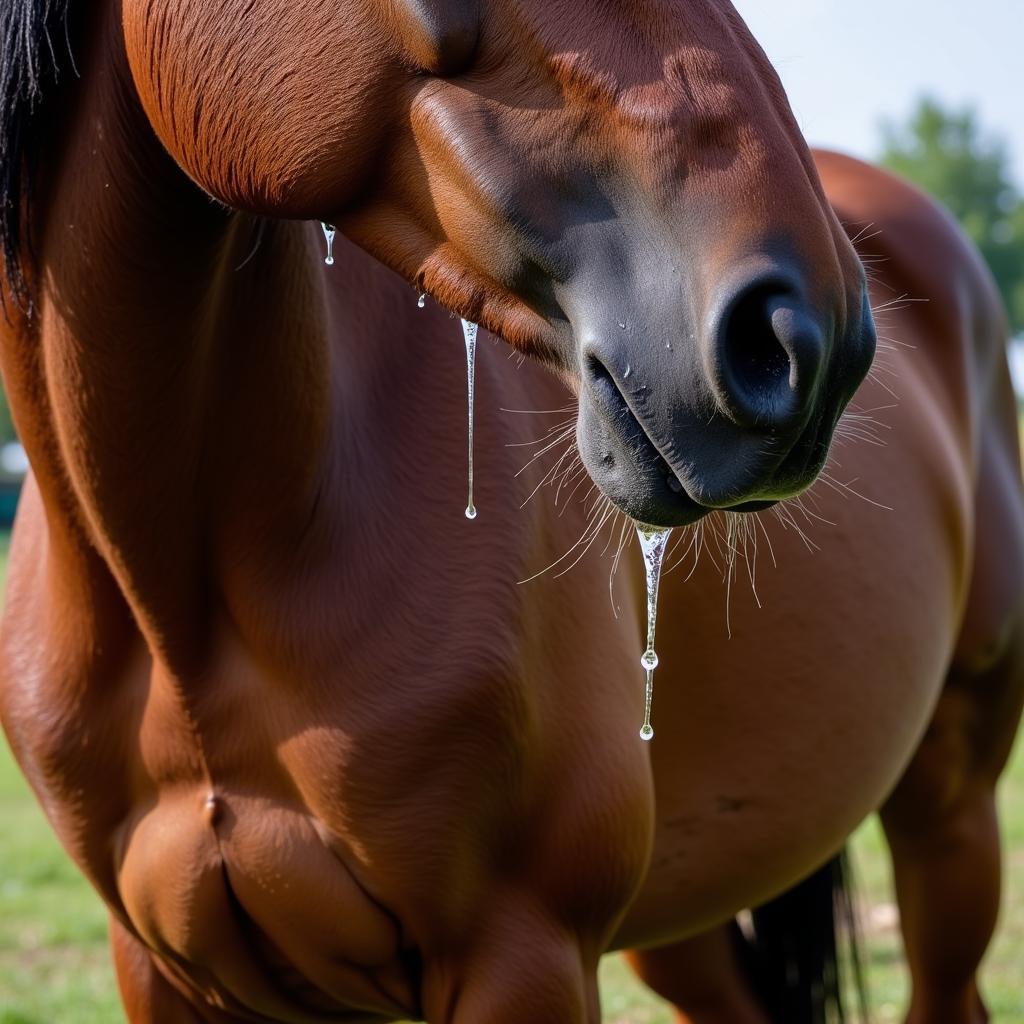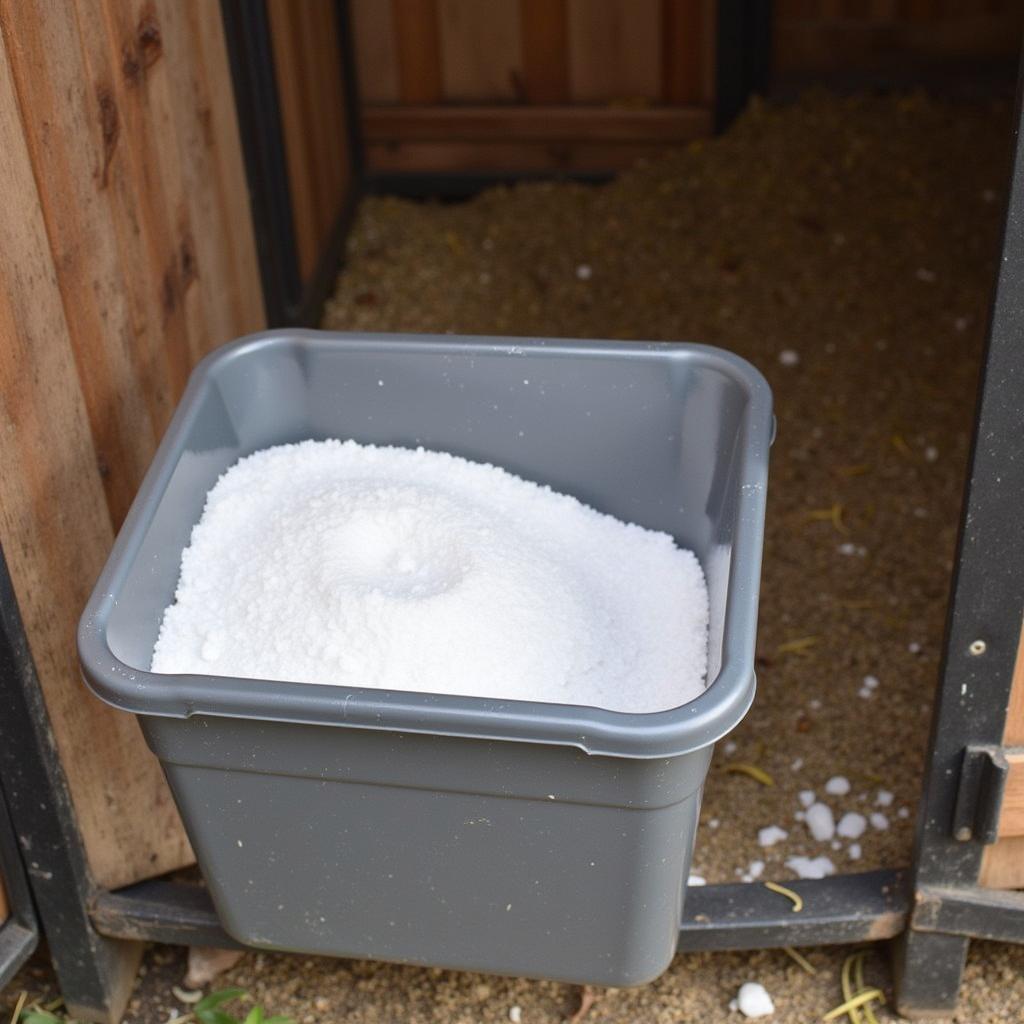Salt is a crucial mineral for horses, impacting hydration, muscle function, and nerve impulses. So, Do Horses Need A Salt Block? The answer isn’t a simple yes or no. While providing salt is essential, the method requires careful consideration.
Understanding the Importance of Salt for Horses
Horses lose salt through sweat, especially during exercise or in hot weather. This loss disrupts the delicate electrolyte balance, leading to dehydration and potential health issues. Providing access to salt allows horses to replenish these essential minerals and maintain optimal health.  Horse sweating profusely after exercise
Horse sweating profusely after exercise
Why Salt is Essential for Equine Health
Salt plays a vital role in various bodily functions:
- Hydration: Salt helps regulate fluid balance, crucial for preventing dehydration.
- Muscle Function: Proper muscle contractions rely on a healthy electrolyte balance, including adequate salt intake.
- Nerve Impulses: Salt is essential for transmitting nerve signals, supporting healthy nervous system function.
- Digestion: Salt aids in nutrient absorption and digestive processes.
Without enough salt, horses can experience fatigue, muscle weakness, and decreased performance. They may also develop a craving for salt, leading to licking objects or even consuming dirt.
Different Ways to Provide Salt to Horses
While salt blocks are a common sight in pastures, they aren’t the only way to provide salt. horse mineral block can be a suitable option too. Let’s explore the pros and cons of each method:
Salt Blocks: Pros and Cons
- Pros: Convenient, readily available, and relatively inexpensive.
- Cons: Horses may not consume enough, especially if they aren’t accustomed to licking hard blocks. Some horses may also overuse the block, leading to excessive salt intake.
Loose Salt: An Alternative to Salt Blocks
Loose salt can be offered in a small container or mixed with feed. This method allows for easier consumption and more accurate monitoring of intake. free choice minerals horses can also offer a wider range of essential minerals in addition to salt.
- Pros: Easier to consume, allows for accurate measurement of intake.
- Cons: Requires more frequent replenishment, can be messy if spilled.
Electrolyte Supplements: For High-Performance Horses
Horses engaged in strenuous activity or exposed to hot weather may benefit from electrolyte supplements. These supplements provide a balanced blend of electrolytes, including salt, to replace those lost through sweat. Check out our article on lyte horse for more information.
- Pros: Quickly replenishes electrolytes lost through sweat, ideal for high-performance horses.
- Cons: More expensive than other methods, may not be necessary for horses with lower activity levels.
How to Determine if Your Horse Needs More Salt
Several factors influence a horse’s salt requirements:
- Activity Level: Horses in heavy work require more salt than those in light work or at rest.
- Climate: Hot and humid weather increases salt loss through sweat.
- Diet: Some feeds contain added salt, which should be considered when determining supplementation needs.
Observing your horse’s behavior can also provide clues:
- Increased Thirst: A sudden increase in water consumption can indicate a need for more salt.
- Licking or Chewing on Objects: This can be a sign of salt deficiency.
- Fatigue or Muscle Weakness: These symptoms can also point to an electrolyte imbalance.
Dr. Emily Carter, DVM, Equine Nutritionist, advises, “While salt blocks are a convenient option, it’s essential to monitor your horse’s individual needs and adjust the method of supplementation accordingly. Some horses simply don’t utilize salt blocks effectively.”
Do Horses Need a Salt Block? Choosing the Right Method
So, do horses need a salt block? While it’s a common method, it’s not the only or necessarily the best approach for every horse. Consider your horse’s individual needs, activity level, and preferences when deciding how to provide this essential mineral. Consider a horse salt lick holder for convenient placement and access.  Loose salt offered in a container for horses You might even consider supplements for horses that stock up to ensure overall health.
Loose salt offered in a container for horses You might even consider supplements for horses that stock up to ensure overall health.
In conclusion, providing salt is vital for equine health, but the best method varies. Observing your horse’s behavior, considering its individual needs, and consulting with a veterinarian will help you determine the optimal approach for ensuring adequate salt intake.
FAQ
- Can horses have too much salt? Yes, excessive salt intake can lead to health problems.
- How much salt does a horse need per day? The average horse needs about 1-2 ounces of salt per day, but this can vary.
- What are the signs of salt deficiency in horses? Increased thirst, licking objects, fatigue, and muscle weakness.
- Are mineral blocks better than salt blocks? Mineral blocks provide a wider range of minerals, but salt blocks address the specific need for sodium chloride.
- What should I do if my horse won’t lick a salt block? Try offering loose salt or an electrolyte supplement.
- Can I mix salt with my horse’s feed? Yes, this is a common and effective way to provide salt.
- Should I consult a veterinarian about my horse’s salt intake? If you have any concerns, consulting a veterinarian is always recommended.
Dr. Sarah Mitchell, PhD, Equine Physiologist, adds, “Always provide fresh, clean water alongside any salt supplementation to ensure proper hydration.”
For further information on horse health and nutrition, explore other helpful articles on our website. Have questions or need personalized advice? Contact us! Call us at 0772127271, email us at [email protected], or visit us at QGM2+WX2, Vị Trung, Vị Thuỷ, Hậu Giang, Việt Nam. We have a 24/7 customer support team ready to assist you.